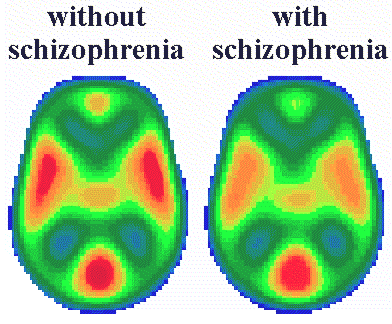|
Within the brain, there are nerves, called neurons, and chemicals called neurotransmitters. One neurotransmitter, dopamine, is thought to cause schizophrenia if there is an imbalance. In a schizophrenic brain, the neurotransmitter works more, and more dopamine is released.
The other neurotransmitter thought to play a role in the cause of schizophrenia is the chemical serotonin (which is also a cause of Seasonal Affective Disorder). However, this link is not as well proven, and the main theory is still the dopamine theory.
PET Scan
Experts do not know the exact cause of schizophrenia, but they do know that the brains of people diagnosed with schizophrenia are different than the brains of people without schizophrenia. For instance, researchers know that when performing a simple task, such as reading a list of words, the brains of people with schizophrenia are less active in some areas than brains of people without schizophrenia.
 |
 |
|

Notice that in the image of a brain with schizophrenia, some areas are less red; in other words, less brain activity.
Scientists do not yet know how or why these differences come about, but they believe these changes are responsible for causing the negative and positive symptoms of schizophrenia. Recent studies suggest that these changes may develop early, maybe even before birth, but may not show up until later in life. |
Researchers use a tool called a PET scan (shown below) to take a picture of the active parts of a person's brain. The red areas of a PET scan show increased brain activity.
|
|  |
 |
|  |
|
Positive and Negative Symptoms
Positive Symptoms
Positive symptoms, which are the most recognizable symptoms of schizophrenia, are mental experiences that most people don't have. Not everyone with schizophrenia has exactly the same symptoms but most people have a combination of both positive and negative ones.
-Hallucinations occur when a person senses things that aren't really there; however, they seem very real to the person experiencing them. The most commonly experienced hallucination is hearing voices. Often a person hears more than one voice at a time. Many times, the voices tell him/her what to do or comment on what s/he is doing. People also have hallucinations where they see, feel, smell or taste something that is not there.
-Delusions are beliefs of a paranoid or bizarre nature that are untrue, but believed by the person experiencing them to be very real. Some people who experience delusions believe that they are being controlled by something besides themselves or believe that people are inserting or removing ideas, or listening to their thoughts.
-Disorganized speech includes incoherent speech and speech in which ideas shift from one subject to another seemingly unrelated subject. This is sometimes described as "loose associations". Other types of disorganized speech include responding to questions in an irrelevant way, reaching illogical conclusions, and making up words
-People displaying disorganized behavior often look disheveled or strangely dressed. They may also display socially inappropriate behavior, such as repeating gestures or motions in a bizarre manner. Disorganized behavior also includes withdrawing from others, not speaking for long periods of time, and maintaining odd or uncomfortable body postures for a long time.
Negative Symptoms
Negative symptoms are behaviors that are absent from a person 's regular behavior. They are the most common symptoms of schizophrenia. Doctors and clinicians are just starting to understand these symptoms and many people do not recognize them as evidence of schizophrenia. Remember, not everybody has exactly the same symptoms, but most people have a combination of the positive and negative ones.
-Lack of motivation, or lack of energy, is considered a symptom of schizophrenia when it is persistent and prevents people from doing what they want to do.
-People who have trouble speaking or answering questions even when they want to are said to have poverty of speech. They may only be able to say one or two words at a time. Some people say that they can 't speak because the words just "disappear from their mind," or won 't come to them.
-People who have difficulty showing or feeling emotion (have a blank expression on their faces or react to things without emotion) may be experiencing this symptom.
|
 |
|
|
 |
|
|

